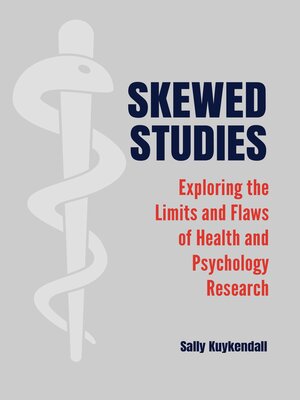Skewed Studies
ebook ∣ Exploring the Limits and Flaws of Health and Psychology Research
By Sally Kuykendall

Sign up to save your library
With an OverDrive account, you can save your favorite libraries for at-a-glance information about availability. Find out more about OverDrive accounts.
Find this title in Libby, the library reading app by OverDrive.



Search for a digital library with this title
Title found at these libraries:
| Library Name | Distance |
|---|---|
| Loading... |
In these uncertain times, how much can you trust health news? Is the research behind breaking headlines reliable? This book is an indispensable resource for students and general readers, helping them evaluate and think critically about health information.
"People Who Drink Coffee Live Longer." "Students Learn Better When Listening to Classical Music." "Scientists Discover the Gene That Causes Obesity." We are constantly bombarded with reports of "groundbreaking" health findings that use attention-grabbing headlines and seem to be backed by credible science. Yet many of these studies and the news articles that discuss them fall prey to a variety of problems that can produce misleading and inaccurate results. Some of these may be easy to notice-like a research study on the benefits of red meat funded by the beef industry, or a study with a sample size of only 10 people-but others are much harder to spot.
Skewed Studies: Exploring the Limits and Flaws of Health and Psychology Research examines the most pervasive problems plaguing health research and reporting today, using clear, accessible language and employing real-world examples to illustrate key concepts. Beyond simply outlining issues, it provides readers with the knowledge and skills to evaluate research studies and news reports for themselves, improving their health literacy and critical thinking skills.
"People Who Drink Coffee Live Longer." "Students Learn Better When Listening to Classical Music." "Scientists Discover the Gene That Causes Obesity." We are constantly bombarded with reports of "groundbreaking" health findings that use attention-grabbing headlines and seem to be backed by credible science. Yet many of these studies and the news articles that discuss them fall prey to a variety of problems that can produce misleading and inaccurate results. Some of these may be easy to notice-like a research study on the benefits of red meat funded by the beef industry, or a study with a sample size of only 10 people-but others are much harder to spot.
Skewed Studies: Exploring the Limits and Flaws of Health and Psychology Research examines the most pervasive problems plaguing health research and reporting today, using clear, accessible language and employing real-world examples to illustrate key concepts. Beyond simply outlining issues, it provides readers with the knowledge and skills to evaluate research studies and news reports for themselves, improving their health literacy and critical thinking skills.







